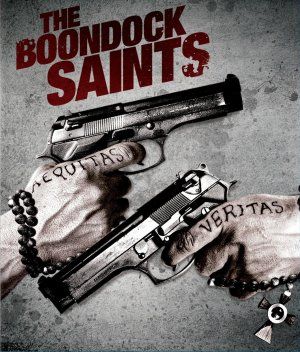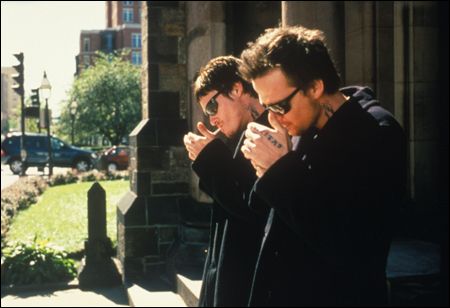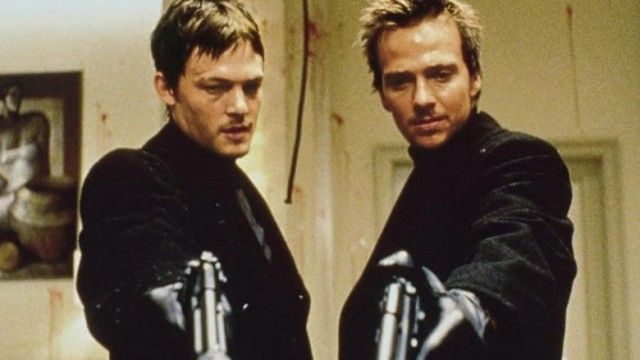In the past, before the likes of Schwarzenegger and Stallone changed the action hero scene with big muscles and borderline incoherence, there were men like Charles Bronson and Clint Eastwood, men who were neither bodybuilders nor loud, boisterous speakers, who carried action movies. Rather than undertaking their murderous rampages for something like patriotic duty or survival against alien beings, their quests tended to be more personal, and while the aforementioned beefcakes did occasionally embark on a journey towards revenge, by the time they did Bronson and his ilk had entrenched themselves in the hearts and minds of young men, like Troy Duffy, writer/director of The Boondock Saints.

Our heroes are fraternal twins Connor and Murphy McManus, seemingly your typical pair of Irish Catholic young men living and working in South Boston. When Russian mobsters show up to close their favorite bar on Saint Patrick’s Day, however, things go awry. The next morning, the Russians are dead in the alley behind some illegal loft housing, the brothers are wounded, and FBI special agent Paul Smecker is interviewing them. While clearly a case of self-defense, the items on the mobsters collected by the brothers and an odd experience in the night convince them that they’ve been put on a path of righteous vengeance, seeking justice for the victims of those who believe themselves above the law. It only gets worse when their friend, a low-level package boy for the local Mafia don, finds himself caught up in their quest.
The Boondock Saints was, at the time of its release, not terribly popular. Troy Duffy had a great deal of trouble getting along with Miramax, and word around many a Hollywood campfire was that the former bartender and bouncer was a pain to work with. The film was only in theatres for five weeks, with most established critics panning it. It was compared unfavorably to Tarantino’s work, and some claimed that Duffy was trying too hard to ape the auteur. It was accused of being all style and no substance, strung together with a threadbare plot, so on and so forth. And yet, the film has a strong cult following today, and its popularity has spawned a theatrical sequel, comic books, and many a young person of the 21st century reciting Catholic prayers. Why is this?

Part of the appeal that keeps the movie fresh in the minds of its fans is the chemistry between the brothers. Sean Patrick Flannery and Norman Reedus have a very natural cadence and rhythm with one another, moving easily between sibling rivalry and deadly penitence and back again. It’s very difficult to not find their relationship and antics endearing, in a way. While their characters never delve into deep philosophical issues or much existential angst, they do exhibit emotional complexity and intelligence, as well as being more than capable of dispatching armed goons of organized crime. Their characters may be somewhat stripped down (especially in one of the deleted scenes), but their straight-forward nature works given the context of the film.
There’s also the character of Smecker, played excellently by Willem Dafoe. A complex and brilliant man, he is also tortured by his own nature and questioning the rightness and wrongness of what he wants, be it a relationship with a man or to support the McManus brothers. David Della Rocco balances the competence and intelligence of the brothers with his well-intentioned bumbling, and the rest of the supporting cast fleshes out the city of Boston extremely well, from the imaginative but somewhat oblivious detective Greenley to Doc, the Irish bartender with Tourette syndrome. Duffy puts all of these elements together rather well, and while the end result has some weaknesses, it’s clear that it’s worthy of the cult status it’s gained, and remains a favorite St. Patrick’s Day tradition for many, including myself.

Say it if you know the words…
Stuff I Liked: Connor’s tendency to think in action movie terms, and Murphy’s frustration with this idiotic thinking. Rocco’s antics. The build-up and reveal regarding Il Duce. The trio of Boston detectives. Doc.
Stuff I Didn’t Like: A few scenes feel overly long. Duffy does the occasional camera trick that doesn’t quite fit. And that poor cat.
Stuff I Loved: The brothers. The endlessly quotable lines. The creativity of the kills. The way the action scenes are cut together with Smecker reconstructing the scene. Smecker in general. The family prayer.
Bottom Line: The Boondock Saints is proof that box office success does not always coincide with the quality of the film. Other more successful action movies are less interesting, funny, and intelligent than this. It may not be the best action flick ever made, but it’s definitely up there, and if you find appeal in normal men moved to vigilante justice, you’ll find this one right up your alley.


